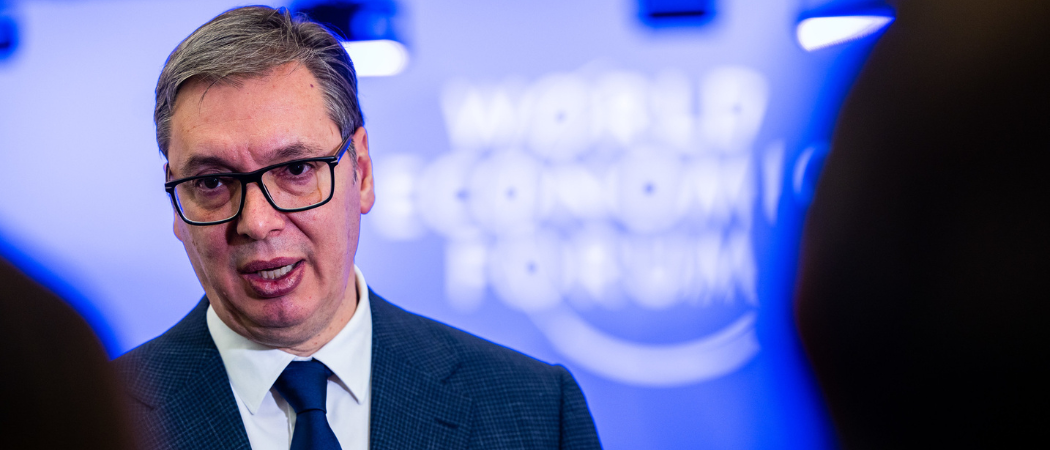New curbs on academic freedom mean Serbia no longer meets conditions for joining the EU, campaigners argue

President of Serbia Aleksandar Vučić is pictured during the World Economic Forum Annual Meeting 2025 in Davos-Klosters, Switzerland. Photo credits: Ciaran McCrickard / World Economic Forum
Thousands of Serbian scientists and artists have signed a call for the European Commission to reopen chapter 25 of their country’s EU accession process, the section that covers research and science. This is necessary, the call says, because of recently introduced curbs on academic freedom, which are endangering livelihoods in the country.
Student and academic delegates from Serbia have been meeting EU officials this week to set out their case. They are also urging the Commission to stand with academics and others “who defend European values of democracy, education, and scientific freedom, and to stop supporting a regime that is systematically destroying them.”
The movement follows a March decree in which the government of president Aleksandar Vučić limited the time academics at public universities can spend on research and arts to just one hour a day. This is widely seen as retaliation for academic support of student anti-corruption protests in the country, which have been taking place since November.
Academics say the decree, which reduces researchers’ working time from 20 to five hours per week, is unlawful and has slashed their salaries to just 12.5 per cent of their normal levels. The teaching part of their salaries had already been suspended because of months-long breaks in lectures due to student walkouts and faculty blockades.
The call, which is supported by around 4,000 university professors, scientists and artists from Serbia’s state universities, describes the “devastating consequences” of the decree. These include hindering applications for international research grants, weakening prospects for career development, financial hardship, and the erosion of accreditation and quality assurance of university programmes.
They are now asking the Commission to either revisit Serbia’s accession process, or to call publicly for the decree to be revoked. “Without urgent and decisive action,” they say, “Serbia's scientific community will face irreversible damage, and the country will no longer meet even the basic requirements expected of a future EU member state in the area of science and research.”
Specifically, the academics want the Commission to reactivate monitoring mechanisms for chapters 25 (research and science) and 26 (education and culture) and to ensure that Serbia complies with the standards and obligations it has already undertaken to meet.
Related articles:
- Serbia’s academics outraged over limits to research, disappointed by EU response
- Serbia’s EU research grantees call on European Commission for help amid mass protests
They also want a suspension of all financial support to infrastructure projects such as BIO4B bio-economy campus in Belgrade, which is co-financed with loans from the European Bank for Reconstruction and Development and the Council of Europe Development Bank.
“[It is] unreasonable to invest in new research facilities at a time when the government is actively dismantling the foundations of science and education,” said Sofija Stefanović, a professor of physical anthropology and bioarchaeology at the University of Belgrade who is part of the delegation visiting Brussels this week.
Community support
The academic delegation also hopes to raise awareness of the situation in Serbia and rally support in the international research community.
“The severity of the situation, and its implications for academic freedom, funding transparency and research governance, are such that we believe the international scientific community has a strong interest in responding,” said Stefanović. “We hope that key research institutions will recognise this as not just a national crisis, but a threat to the values that the European Research Area is built upon.”
So far, the delegation has met with Maria Leptin, president of the European Research Council (ERC). “If members of the scientific community who feel that their academic freedom is threatened ask to be heard, then I will listen to them,” she told Science|Business. “This is important, even if the ERC does not influence national politics as such.”
The European University Association (EUA) is also monitoring the situation “and will respond accordingly,” said Ivanka Popović, vice-president of the organisation and a former rector at the University of Belgrade.
Support has also come from individual universities and the Rectors’ Forum of Southeast Europe and the Western Balkans. “We remain hopeful that European institutions will recognise the urgency and severity of this development,” Stefanović said.
According to Raša Nedeljkov, programme director at the Center for Research, Transparency and Accountability in Belgrade, there is a growing awareness in the EU institutions and member states that the students’ demands are “practically the same” as those made in the EU accession process. These include the rule of law, functional institutions, combatting corruption and protection for human rights.
“Students have been so persistent in their non-violent protest and so efficient in gaining support from the citizens of Serbia that the EU finally had to take them seriously,” Nedeljkov added.
Popović can also see indications that the EU is changing its position toward the Serbian government. “I hope that they will continue to do so,” she said. However, she thinks that the Serbian government “most probably would not be fazed” by reopening of chapter 25.
Meanwhile, the students have called for the dissolution of Parliament and extraordinary parliamentary elections. “It is now for the government to respond to that request,” Popović said. “Serbia needs rule of law and independent institutions. The students and citizens of Serbia will not rest until they achieve these goals.”
Serbia’s government and the Commission were both approached for comment.





 A unique international forum for public research organisations and companies to connect their external engagement with strategic interests around their R&D system.
A unique international forum for public research organisations and companies to connect their external engagement with strategic interests around their R&D system.